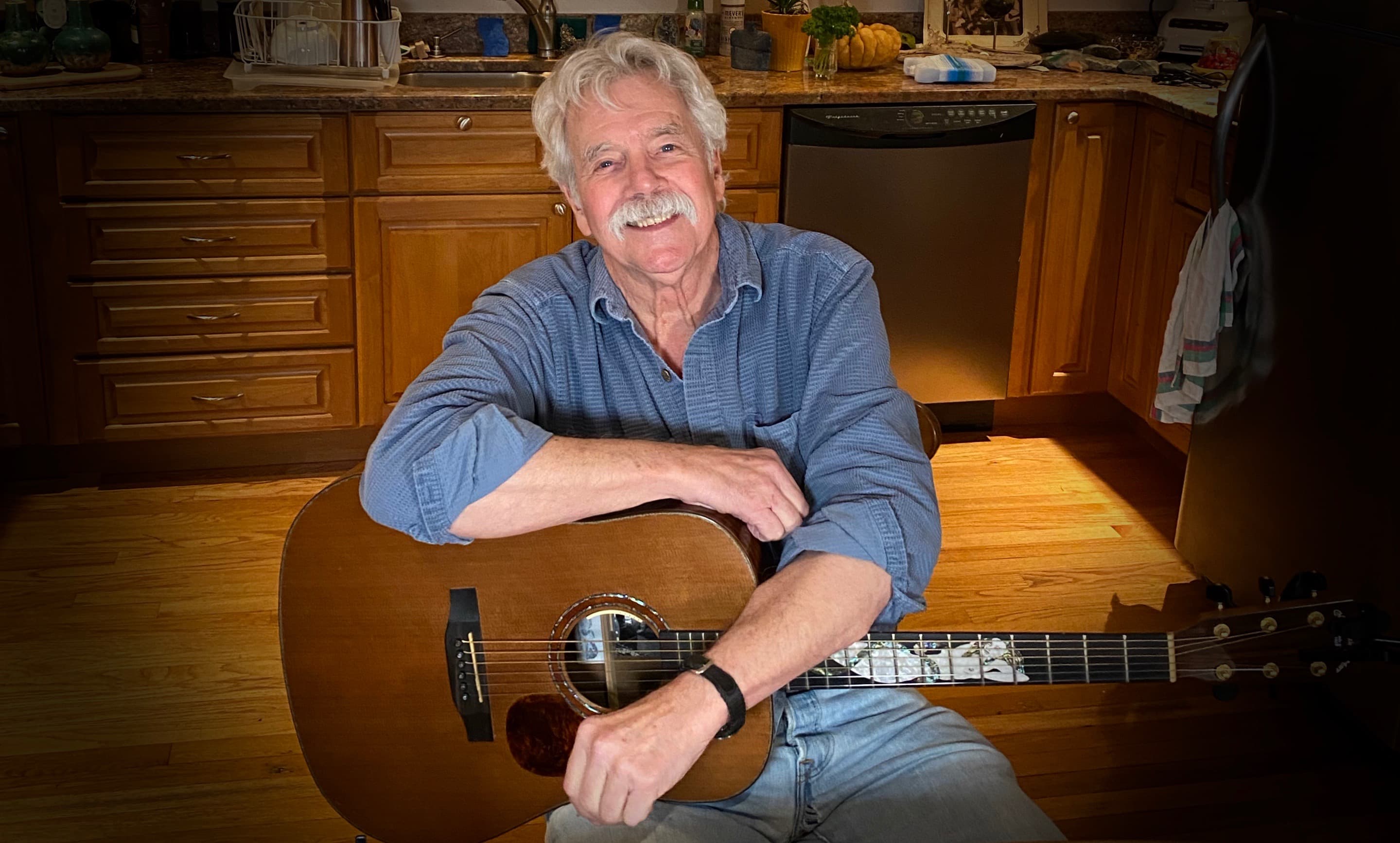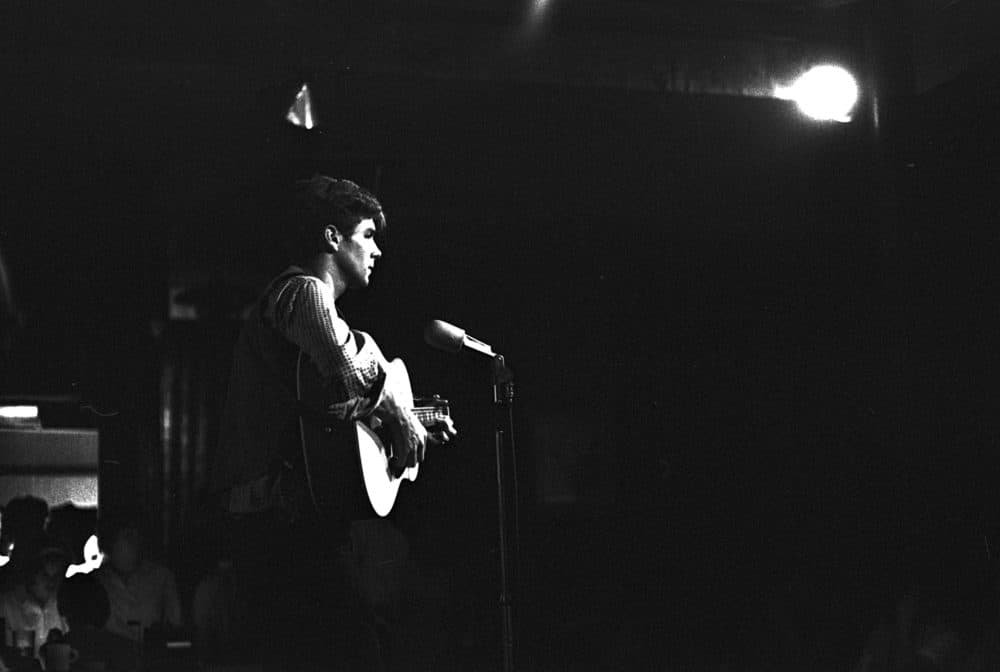Advertisement
On His 80th Birthday, Musician Tom Rush Reflects On A Career That's Been '99% Magic'

It was the summer of 1970, and Harvard grad Tom Rush found himself barreling across Canada on a train carrying the Grateful Dead, Janis Joplin, The Band, The Flying Burrito Brothers and other hippie-musicians, bluesmen and folkies.
Billed as a Canadian Woodstock, the Festival Express — loaded with an onboard film crew, impromptu jam-sessions and booze — rambled from Toronto to Calgary, stopping for concerts along the way. Legend has it that at one point, like his Casey Jones, Jerry Garcia was driving that train, high on cocaine. (Rush can’t remember.)
"We drank the train dry about 12 hours out of Toronto. We made them stop at some little prairie town and bought everything — every single bottle — in the local liquor store,” Rush recalls.
The motley crew clamored off in Calgary, “where the promoters had rented the local gymnasium swimming pool for us to go swimming. Everybody, of course, wanted to go skinny dipping," Rush said.
“The officials in charge of the pool were horrified. But it was our pool; they couldn’t stop us. They did have one rule: anyone with long hair had to wear a bathing cap. Which was everybody.
“My brain is permanently scarred by the sight of Leslie West of Mountain coming out of the changing room wearing nothing but two bathing caps — one over his head, and the other upside-down over his beard,” says Rush, in a phone interview from his Rockport, Massachusetts studio.
And this is the fun of talking to Rush.
A raconteur at heart, the singer-songwriter is full of stories like this.
In pre-pandemic days, it was half the reason to see him live — the other half, of course, were tear-jerkers like “No Regrets,” his famous covers of Joni Mitchell's “Urge for Going,” Murray McLauchlan's “Child's Song,” Jackson Browne's “These Days.”
But now, with no venues open, his stories and songs are part of his new “Rockport Sundays” subscription series. Via Patreon, subscribers can see Rush perform each Sunday.
The folk icon — who introduced the world to Mitchell, Browne and James Taylor on his seminal album “The Circle Game” — turned 80 on Feb. 8.
Now living in Kittery, Maine, the New Hampshire-born musician reflected on a wild year (including a COVID-19 diagnosis) and wild years past.
Lauren Daley: So tell me about “Rockport Sundays.”
Tom Rush: Every Sunday I send out a video clip of me at the kitchen table singing... Some Sundays I’ll tell stories from the road — skinny dipping with Janis Joplin; Clint Eastwood and the hashish brownie.
What’s the Clint Eastwood story?
I was living in downtown Greenwich Village, and a fan had sent me a box of brownies, with a note that said, “One is loaded.” I thought, “How do you load one brownie? This is baloney. They’re just brownies.” Well, of course, you make two pans.
So I ate most of one, but it tasted funny and I decided I wouldn’t finish it. I sped off on foot across Washington Square Park to go to this record release party and halfway, I stopped — I couldn’t remember where I was, where I was going, or why I was going there.
After 10 minutes, I headed off down a side street; there were all these lights and cameras, and I’m standing there trying to figure out what’s going on. There’s a barricade around a piece of sidewalk in front of a building, and there’s a crowd, and the door bangs open of this brownstone, a woman runs out screaming. A couple seconds later, Clint Eastwood comes out chasing her. And that’s when it got weird.
Some guy from the crowd leaps over the barricade and cold-cuts Clint Eastwood, knocks him to the ground. It was in the newspapers the next day. [They were shooting a movie.]
[Laughs] Wow. So you also had quite the 2020. What was your experience with COVID-19?
My last show was March 10 in Florida, and I started having symptoms on March 17. I think I picked it up on the plane home, because I was hanging out with some people in West Palm Beach and none of them got it.
It was about five days of getting worse and worse, [then] I tested positive. I never had the cough or the respiratory stuff, or the fevers. I was just exhausted, aching all over, slept about 20 hours a day for the worst days. At the end of two weeks, I was about 90% better.
It’s such a weird virus. Some people have no symptoms, other people die. And everything in between. A little later, I was having heart palpitations. They put a heart monitor on me. On a Friday at 5:30 p.m., my doctor called and said: I want you to go to the emergency room. Get an ambulance to bring you to Mass General now.
I said, “What, wait? What’s going on?” He said, “We’re concerned you might have an event.” I said, “What sort of event are we talking about?” He said, “The technical term is ‘sudden cardiac death.’" I said, “You could at least say it in Latin. Come on. At these prices?”
[Laughs] Oh my god.
But I did not do what he instructed. I went back to my place in Kittery, Maine, had a nice dinner, and went in the next day. Basically they had discovered, quite accidentally, that my heart rate was going down to 23 beats a minute from time to time. It was totally unrelated to the palpitations that got me the heart monitor. But they put a pacemaker in, and now I’m pretty much invincible.
Wow. So was this an aftereffect of COVID-19?
I can’t prove it, but I’m pretty sure. That’s the other bizarre thing about the virus: people have all kinds of delayed effects.
How do you feel now?
I feel fine. About to turn 80. The Wang [Theatre] was going to host a birthday party for me with all kinds of guests, so that will be delayed, or may not happen. In the meantime, [performing virtually] gives me an audience. I think all performers miss having an audience.
What’s the hardest part of being a musician right now?
There are layers to it. I had a year’s worth of shows canceled — this is how I make a living, and all of the sudden that faucet is turned off. [Live music returning] depends on vaccine rollout. We also need people to be confident in it. So I’m hoping everybody gets vaccines and feels they can go out without worrying. But it’s going to take a while.
You mentioned your birthday — have you been reflecting back on your career lately?
No, but I probably should, shouldn’t I? You’re making me feel guilty, Lauren.
[Laughs] Reflecting now, do you have favorite songs that stands out?
My favorite song is always the next one. But I think I’ve written some of the best stuff of my career in the last few years. I wrote a song for my daughter Siena when she was like 2. I forgot all about it. When she turned 19, I happened upon the lyrics, and when she turned 20, I set it to music, “Siena’s Song.”
... “No Regrets” put two of my kids through college. That got a lot of covers over the years — Johnny Cash, Waylon Jennings, even U2.
So what was it like starting out in Boston? You were at Harvard.
I arrived in Cambridge in the fall of ’59 as a freshman, delighted to find there was a vibrant folk music scene. I spent way too much time at Club 47 [now Passim] according to my parents. And they were probably right from an academic standpoint, because I came very close to flunking out.
I had a radio show at Harvard’s station, and went around to the hootenannies, looking for guests. I discovered you could get in for free if you had a guitar. Then I discovered you could get in for free if you had a guitar case. So I’d put a six-pack in the case and head off to the hootenanny.
I got caught one night at The Golden Vanity [where they called me up] onstage. I borrowed a guitar. I don’t remember what I did because I was so nervous. Apparently it went well enough, because the owner called me back a couple weeks later, and one thing led to another.
Then [I started] doing coffeehouses around Massachusetts, then around New England, started to travel further and further.

You introduced people to songs by Joni Mitchell, James Taylor and Jackson Browne. How did you get on to them so early?
Joni, I met in Detroit at a place called The Chess Mate. She and her [then] husband had been playing there on a regular basis. She had just started writing songs and wanted me to hear some of them, and maybe record them. She did a quick guest-set, and she just knocked me over. “Urge for Going” was one of the songs she sang that night, and I was just dumbfounded that this little slip of a girl would be singing a song that was so compelling and gorgeous. She sent me a tape a few weeks later with six more songs, one of which was “The Circle Game.” She apologized for it on the tape: “I just finished writing this, it’s not much good, I’m sorry.” And I ended up naming the album after it.
Wow.
James, I almost met a bunch of times. I had a roommate when I was living in Cambridge, Zach Wiesner [bassist for] this guy James Taylor, who had a band called The Flying Machine. Zach kept telling me I should really hear this guy. And I kept saying, “Zach, will you just pick up your room?”
A couple years later, my producer Paul Rothchild at Elektra said, “There’s a songwriter you should get together with.” We got James and me up to the Elektra offices. We sat on the floor and James sang a bunch of songs into a tape-recorder. I ended up doing a couple of his songs on “The Circle Game.”
Jackson Browne was not a singer-songwriter, he was just a songwriter at that point. Elektra was pumping me up with his demos. All three appeared for the first time in public on “The Circle Game” album. I wasn’t looking to discover anybody — I just wanted to meet girls.
[Laughs] Are there any other moments that stand out, looking back?
Meeting Joni was one. There’s been a whole lot of magical moments. That’s why I love performing live. It’s never really like work. There are moments when it’s hard work — mostly the traveling part. But the time on stage is 99% magic.
This interview has been edited and condensed for clarity.


